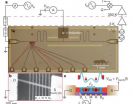"We found that patients with bladder cancer with shorter telomeres and high levels of depression symptoms have a threefold increased risk for mortality," said Meng Chen, Ph.D., an epidemiologist at The University of Texas MD Anderson Cancer Center in Houston.
As part of an ongoing, large-scale epidemiologic study of bladder cancer, Chen and colleagues collected clinical and mental health information on 464 patients with bladder cancer. They assessed patients' depression levels with the Center for Epidemiologic Studies Depression Scale (CES-D).
Depression symptoms alone affected mortality: Patients with CES-D scores of 16 or greater had a median survival time of 58 months, while those with scores below 16 had a median survival time longer than 200 months. In addition, patients with CES-D scores of 16 or greater had a 1.89-fold increased risk for all-cause mortality compared with patients with CES-D scores less than 16.
Telomere length was measured from patient blood samples. Univariate analysis revealed that long telomeres were associated with improved survival, but this finding was not significant in a multivariate analysis.
When evaluating the combination of depression and telomere length, the researchers found that compared with patients without depression symptoms (i.e., CES-D scores less than 16) and long telomeres, patients with depression symptoms (i.e., CES-D scores of 16 or greater) and short telomeres demonstrated more than a threefold increased risk for mortality and significantly shorter disease-free survival (31.3 months versus 199.8 months).
Although the mechanisms behind these findings need to be furthered studied, "these results suggest the potential important role of psychological factors to improve survival in cancer patients," Chen said.
In addition, the researchers pointed to evidence that smoking cessation, weight loss and increased physical activity can slow telomere shortening and potentially improve survival.
"In terms of building a prediction model for bladder cancer mortality, current models only focus on clinical variables, such as treatment and tumor stage and grade," Chen said. "Our study suggests that psychological factors and perhaps lifestyle changes could be included in this prediction model."
### Follow the AACR on Twitter: @aacr #aacr Follow the AACR on Facebook: http://www.facebook.com/aacr.org
About the American Association for Cancer Research Founded in 1907, the American Association for Cancer Research (AACR) is the world's first and largest professional organization dedicated to advancing cancer research and its mission to prevent and cure cancer. AACR membership includes more than 34,000 laboratory, translational and clinical researchers; population scientists; other health care professionals; and cancer advocates residing in more than 90 countries. The AACR marshals the full spectrum of expertise of the cancer community to accelerate progress in the prevention, biology, diagnosis and treatment of cancer by annually convening more than 20 conferences and educational workshops, the largest of which is the AACR Annual Meeting with more than 17,000 attendees. In addition, the AACR publishes seven peer-reviewed scientific journals and a magazine for cancer survivors, patients and their caregivers. The AACR funds meritorious research directly as well as in cooperation with numerous cancer organizations. As the scientific partner of Stand Up To Cancer, the AACR provides expert peer review, grants administration and scientific oversight of team science and individual grants in cancer research that have the potential for near-term patient benefit. The AACR actively communicates with legislators and policymakers about the value of cancer research and related biomedical science in saving lives from cancer.
For more information about the AACR, visit www.AACR.org.
Abstract:
138675_1 Depression and short telomere length increased mortality in bladder cancer patients. Meng Chen, Jie Lin, Jan Blalock, Lorenzo Cohen, Paul M. Cinciripini, Xifeng Wu. UT MD Anderson Cancer Center, Houston, TX.
There is compelling evidence suggesting that depression is associated with elevated mortality in aging-related diseases, including cancer. Telomere shortening is a marker of biological aging and is involved in cancer development. Recent studies have shown that major depressive disorder with a chronic course is associated with shortened telomere length. Several conceptual models have been proposed to explain the underlying mechanism between depression and cancer; however, no study has evaluated depression and telomere length in modifying cancer outcomes. In a prospective study, we recruited 464 bladder cancer patients and collected demographic, clinical and depression data. Telomere length was measured from blood samples at baseline for each patient. Depressive symptoms were assessed using the Center for Epidemiologic Studies Depression Scale (CES-D). Multivariate cox regression was used to assess the association between depressive symptoms, telomere length, and bladder cancer mortality, as well as the joint effect of depressive symptoms and telomere length on bladder cancer mortality. The Kaplan-Meier plots and log rank tests were applied to compare survival time of subgroups by depressive symptoms and telomere length. During a median follow up of 21.6 months, 88 deaths occurred. Patients with CES-D scores ≥16 (clinical screening criteria) had a 1.89-fold (95%CI: 1.12-3.20, P=0.018) increased risk of all-cause mortality relative to patients with CES-D scores < 16. The Kaplan-Meier survival analysis showed shorter survival for those with CES-D scores ≥16 (CES-D scores ≥16 = 58.0 months vs. CES-D scores < 16 = >200 months, P log rank=0.004). In univariate analysis, long telomere length (dichotomized by median) was associated with significantly improved survival (HR=0.55; 95% CI=0.34 to 0.89. P=0.015), but the association was not significant in multivariate analysis. A joint effect of short telomere length and depressive symptoms was observed: compared to patients with CES-D scores < 16 and long telomere length, patients with CES-D scores ≥16 and short telomeres exhibited an over 3-fold increased risk of mortality (HR=3.19, 95% CI, 1.44-7.04, P=0.004) and significantly shorter disease-free survival (31.3 months vs. 199.8 months, P END

